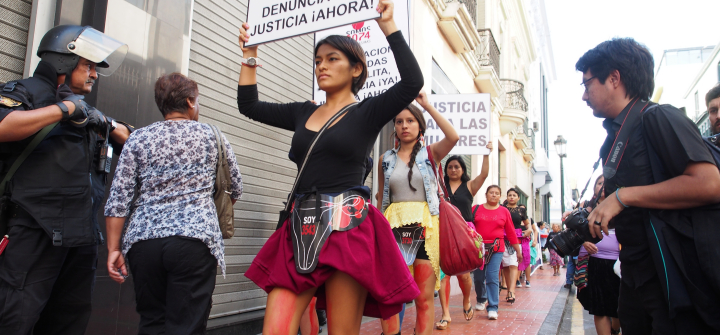Contraceptive Coercion Still Happens
PATTAYA, THAILAND—Despite the family planning community’s firm rejection—decades ago—of coerced contraception, the practice remains an all too real, according to Leigh Senderowicz, ScD, MPH.
The 1994 International Conference on Population and Development in Cairo served as a well-known reckoning for the family planning community, notes Senderowicz, an assistant professor at the University of Wisconsin-Madison—with delegates disavowing coercion no fewer than 16 times in the Cairo Plan of Action. It marked the family planning community's sharp repudiation of any vestiges of the eugenics and population control movements earlier in the 20th century. Those efforts , which sought to limit fertility overall and target certain groups for fertility control through economic penalties for high fertility, recruitment quotas for providers, and compulsory sterilization for women.
“As a research community, we’ve been operating on the assumption [since then] that coercion isn’t really happening so we don’t need to go looking for it or do any research on it,” Senderowicz said. But she went looking anyway—leading to her presentation titled “When They Force a Woman, It’s to Save Her Life,” which she shared at a scientific session at the International Conference on Family Planning. She explored questions of ethics, contraceptive coercion, and choice in family planning.
Senderowicz recalled that in 1979, then-president of the Population Council Bernard Berelson published a paper making the case there are “undoubtedly cases of justified coercion,” though “overt violence and injurious coercion is not to be used before noninjurious coercion has been exhausted.”
Yet despite the community’s repudiation of such ideas, every so often, a story in the news challenges the narrative that they are safely in the past, Senderowicz says—such as the case of 12 women who died in a mass sterilization camp in India in 2016. “But when stories like this pop up, the family planning community tends to treat these as outliers—blamed on a rogue provider or out-of-touch policymaker rather than indicative of something more deep-seated,” she said.
Senderowicz set out to hunt for evidence of ongoing contraceptive coercion, and to apply a reproductive justice lens to understand how communities make sense of it. Her team conducted 17 focus group discussions with 146 women in urban and rural settings in an anonymized sub-Saharan African country. (It was necessary to keep the country anonymized, she said, to avoid tying any negative associations of coercion to a single country.)
What they concluded: Contraceptive coercion was in fact very widely acknowledged in the communities they studied, primarily under 3 main rationalizations:
- To prevent women/couples from having children they can’t “properly” care for
- To prevent women from having “too many” children “too quickly”
- To ostensibly protect the life or health of the woman
For example, one focus group participant described a woman who had several children 6 months apart; health workers told her that if she became pregnant again she’d have to travel to a distant center for care because “they just couldn’t with her anymore.”
“What we see here,” Senderowicz said, “are health workers are refusing to provide prenatal and perinatal care to a woman in the name of maternal health.”
When the researchers asked participants whether it is okay for a health provider to force a woman to adopt a contraceptive method, one woman said, “But when they force a woman, it’s to save her life.”
The anecdotes make it “abundantly clear that coercion is startlingly commonplace in this context,” Senderowicz said. And, while the research doesn’t show how prevalent coercion is, “the ease, the nonchalance with which people talked about it suggested it is a routine occurrence in the communities,” she commented.
Senderowicz underscored the similarity of these rationales for coerced contraception to the rationals the eugenics movement used in the 1900s—aimed at preventing those in poverty, those in ill health, those with disabilities from procreating. “There’s this very paternalistic idea that forced contraception it’s for the woman’s own good even if they couldn’t see it yet,” Senderowicz noted.
These cases of contraceptive coercion represent “a profound breach of contraceptive autonomy and reproductive justice,” Senderowicz said; she concluded that the family planning field still has a lot of work to understand how women are still being forced to adopt contraception in some places, and put an end to it.
Furthermore, Senderowicz said, “The normalization, the seeming justification of [contraceptive coercion] in this context brings to mind the disrespect and abuse in maternal health care.” She suggested that family planning researchers might borrow from work probing the origins of obstetric violence to better understand the roots of, and how to end, contraceptive coercion.
GHN's Dayna Kerecman Myers is on location in Pattaya City, Thailand, for the International Conference on Family Planning 2022. Follow all of GHN's coverage from the conference here.
Join the 50,000+ subscribers in 170+ countries who rely on Global Health NOW summaries and exclusive articles for the latest public health news. Sign up for our free weekday newsletter, and please share the link with friends and colleagues.
Young women from the activists group “We are 2074” marching to demand justice for indigenous women who were forcibly sterilized decades ago. May 10, 2016, Lima, Peru. Fotoholica Press/LightRocket via Getty





